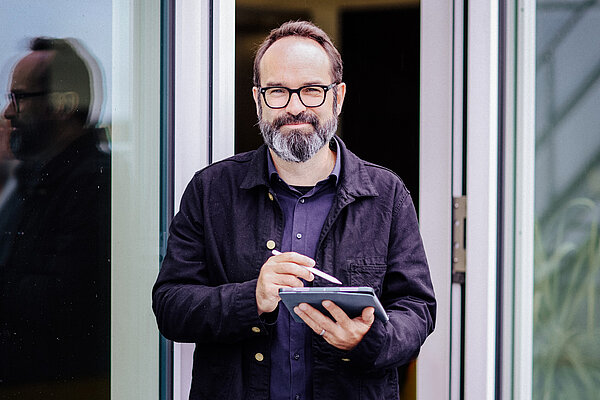As the new professor for "Networked Energy Systems", Prof Schneider researches and teaches climate-friendly energy supply. Together with students, he wants to develop new solutions for the successful networking of energy systems in order to make the industry fit for a climate-friendly future.
A. Schreyer: Prof Schneider, you have held the Chair of Networked Energy Systems at the Faculty of Engineering since January 2021. What are the new areas of responsibility you have taken on as a professor?
Prof Schneider: In order to combat climate change, a successful energy transition away from fossil fuels such as coal, oil and gas towards renewable energies, especially wind and solar, is imperative and urgently needed. Wind and solar plants generate electricity very cheaply and in a climate-friendly way, but are dependent on the weather. In the new energy system, demand must therefore react to supply. As the flexibility required for this in the electricity sector alone is not sufficient, electrical storage systems are relatively expensive and other energy sectors do not have similarly cheap and climate-friendly energy sources, networking with the energy systems for heat, gas and mobility is beneficial for all sides. In all three areas, large, cheaper energy storage systems are either already available or are currently being developed. Networking requires digitalisation for information processing of data from all energy sectors and optimal regulation of supply and demand based on market data. The complexity, significance and scope of this new challenge justify a new chair at HTWK Leipzig to prepare students for the tasks in their professional field not only in energy technology, but also for information technology and digitalisation.
Bachelor's degree programme
Compulsory subject: Energy Systems Engineering
Compulsory elective subjects: Energy conversion and storage technologies, photovoltaics as an energy source
Master's programme
Compulsory subject: Simulation of networked energy systems
Compulsory elective subjects: Modelling of microgrids, Current topics in energy systems research
A. Schreyer: How did you decide to specialise in this area of research and teaching? Did you already know which path you wanted to take before you started your degree programme?
Prof Schneider: Shortly before I left school in the mid-1990s, I read a newspaper article about the Rocky Mountain Institute in the USA and was fascinated by the many exciting research topics that were being investigated there in the context of efficient energy use and conservation. Energy supply and utilisation plays an essential role in the sustainable use of our planet. The general interest in energy quickly developed into a special interest in photovoltaics, i.e. the generation of electricity from sunlight. In fact, it was with this interest in mind that I decided to study electrical engineering. It was always important to me to make the greatest possible contribution to the success of the energy transition. That is why I have followed the changing development of photovoltaics in Germany professionally and have travelled a path from research to industry and back to research.
Today, the vast majority of low-cost solar modules come from Asia and the big questions revolve around integration into the energy system and successful structural change to make the European industry fit for a climate-friendly future. The FridaysForFuture movement is improving the general understanding of these pressing issues and many motivated young people are coming to the universities and want to make their contribution to a future worth living. I am very much looking forward to supporting the students on this path with my experience and knowledge and to developing new solutions together with them in order to create a successful networking of energy systems.
A. Schreyer: What skills and interests do you think students who decide to study at the Faculty of Engineering should have?
Prof Schneider: An understanding of mathematical methods and physical relationships is of course very important for engineering studies. The ability to programme is very much in demand in many areas today and facilitates the handling of data. Scientific work is characterised by the objective measurement and evaluation of the object of investigation; enjoyment of and interest in this way of working and the resulting knowledge will always help you in your studies. But much more important than all this is your own motivation and the joy of constantly developing and realising new ideas. The engineering profession is characterised by perpetual creativity and dealing with new challenges. Engineers are problem solvers and the old saying still applies: "Nothing is too difficult for an engineer!"
A. Schreyer: What new projects would you like to realise in the future?
Prof Schneider: The great strength of universities is that there are always new students with their own creative ideas and approaches. That's why I would particularly like to develop new solutions together with the students. As described above, programming is an important tool for this, so I have decided to go back to school myself and learn the Python programming language in order to optimally support students in their work and continue to use the results after they graduate. In terms of content, Python offers many possibilities, from calculating solar yields and forecasting electricity market prices to processing energy flows in the sectors for clear visualisation.
I am also planning to set up a new laboratory for "networked energy systems" together with colleagues, in which we can practically simulate the energy conversion between the sectors and their control on a small scale. I want to continue to develop this laboratory both in teaching and in research. Just as the energy system is constantly evolving. There is always room for new creative ideas and I want to create and utilise this at the HTWK in the field of "Networked Energy Systems".
